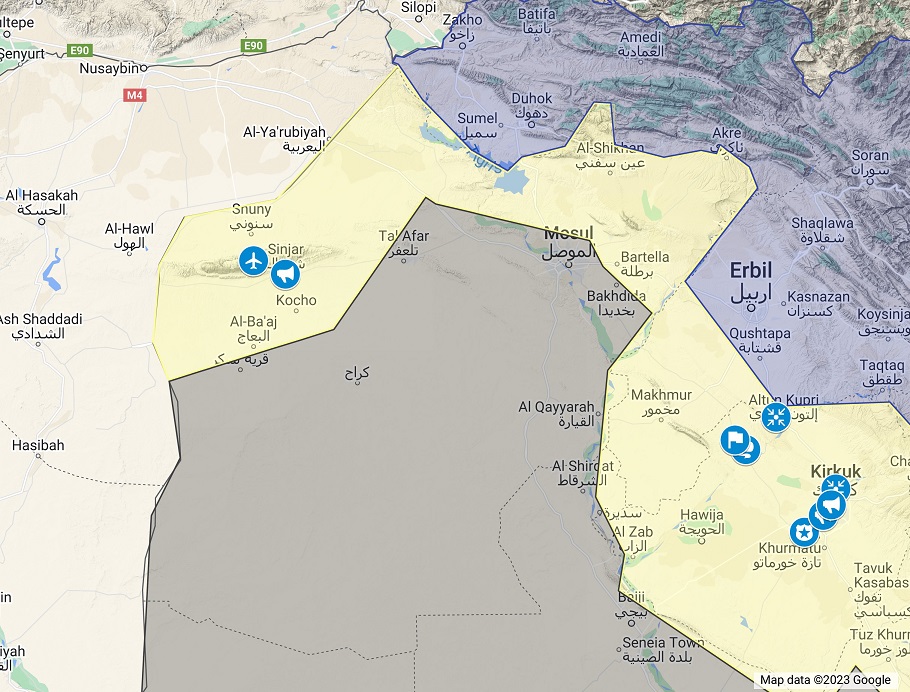1.2K
A biweekly brief of events and news occurred in the disputed territories.
Kirkuk
- The recent hiring of 2,550 police officers in Kirkuk has angered the Kurdish and Turkmen communities, as a staggering 73% of the recruits are Arabs. According to Kurdish and Turkmen politicians, a mere 690 officers, constituting only 27%, represent the Kurdish and Turkmen population. In a press release, Hasan Turan, the leader of the Turkish-backed Turkmen Front, stated, “We vehemently oppose the unjust policies pursued by the Ministry of Interior against the Turkmen community,” and urged the prime minister to “restore justice.” Concurrently, a former Kurdish lawmaker decried the hiring as “a blatant bias against two of the province’s primary ethnic groups,” emphasizing that among the new officers are individuals from other provinces.
- Following the signing of a “border security” agreement between Baghdad and Tehran, the Iranian Kurdish Kurdistan Freedom Party (PAK) was evicted from its headquarters near the Pride district and subsequently disarmed. In response, the Kurdistan Regional Government (KRG) deployed a new Kurdish force to the campound. After the closure of their headquarters, PAK party members were relocated to a camp near the Saedekan subdistrict in Duhok, under the supervision of the KRG.
- On September 24, Rakan al Jabouri, the acting governor of Kirkuk, expressed his strong opposition to the formation of a joint force comprising both the Peshmerga and the Iraqi army, stating, “We do not accept it. We are even against the Kurdistan Regional Guards’ approach to Kirkuk.” Al Jabouri reiterated his longstanding position of advocating for the presence of the Iraqi military alone in the province. It’s worth noting that this stance persists despite Kirkuk’s ongoing security challenges since October 16, 2017. However, on September 26, Tahsin al Khafaji, the spokesman for the Iraqi Joint Operations Command, told Baghdad Al-Youm that “there is a unanimous understanding between Peshmerga commanders and the Iraqi army,” which has resulted in “six successful joint operations in Kirkuk and the disputed territories.” Al Khafaji pledged continued coordination between the army and the Peshmerga to address the security void in the region.
- On September 23, Kurdish journalists in Kirkuk issued a statement expressing their concerns about the Kirkuk administration’s decision to allocate lands exclusively to journalists who are members of the Kirkuk branch of the Iraqi Union of Journalists. This policy effectively benefits only Arab and Turkmen journalists, while members of the Kirkuk branch of the Kurdistan Union of Journalists (KUJ) are being denied government benefits.In their statement, the journalists strongly warned that they would take a firm stance and presented several demands. These demands include being native to the province and emphasizing that benefits should not be contingent on membership in the Iraqi Union of Journalists.
- On September 25, the Iraqi Counter-Terrorism Agency announced the arrest of Abu al-Bukhari, a high-ranking leader of Da’esh in Kirkuk. The operation was conducted based on detailed intelligence and in cooperation with the Kurdistan Regional Government (KRG) security forces. Abu al-Bukhari served as the commander of a battalion composed of foreign fighters within the terrorist organization and was internationally wanted.
- Despite the formation of an investigation committee by the State Administration Coalition more than two weeks ago to probe the deaths of four Kurdish protesters at the hands of the Iraqi army, the committee has not yet visited Kirkuk. The State Administration Coalition, led by Iranian-backed parties and leaders, is the primary bloc that formed the current government. Notably, the Iraqi government spokesperson, Bassam Awadi, announced a “political-governmental” consensus to postpone resolving Kirkuk’s current situation until after the provincial elections scheduled for December of this year.
- According to the monthly statistical report on exports and revenues from the State Organization for Marketing of Oil (SOMO), oil from the Giara field, located within the Kirkuk oil blocks and stored in Kirkuk storage facilities, was transported by tankers to Basra for export. The SOMO report indicates that 420,991 barrels of oil were exported, generating revenue of $32,112,351. This marks the first export of Kirkuk oil since the suspension of oil exports through the Ceyhan port in March. In August, 464,725 barrels of oil were also exported to Jordan, yielding $32,631,500 in revenue.
Shingal (Sinjar)
- On September 17, a Turkish drone struck a vehicle near Mount Shingal, resulting in the deaths of three members of the Sinjar Resistance Units (YBS). These fighters were Yazidis and survivors of the 2014 ISIS (Da’esh) genocide. Turkey has accused them of having connections with the Kurdistan Workers’ Party (PKK).
- On September 19, a 21-year-old Yazidi girl named Faryal Khazr was rescued in Syria after enduring nine years of captivity by Da’esh terrorists. The Women’s Defense Units (YPJ) announced her rescue but did not specify the exact location or date of the operation. According to the YPJ, Faryal was abducted from Shingal at the age of 12 and taken to Syria with other girls and women. During her captivity, she was sold multiple times, and the fate of her relatives remains unknown.

